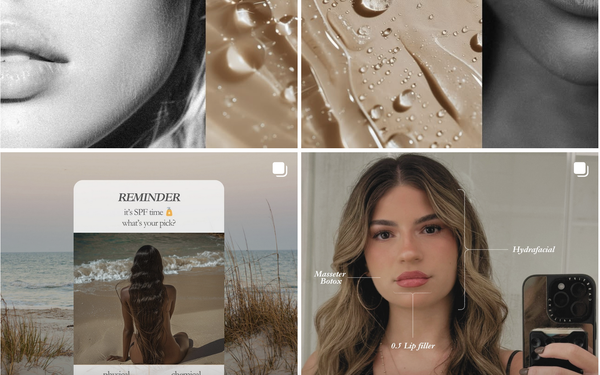;

RealSelf, born 18 years ago as a
website marketplace connecting consumers with providers of medical aesthetics, is getting a facelift.
A key reason: women also born 18 years ago – and their Gen Z cohorts – make up
an increasing audience for non-surgical cosmetic procedures.
In a recent report, Guidepoint Qsight pointed out that Gen Z made up around 10% of all aesthetics patients in 2024, triple their
representation in 2017. Meanwhile, the researcher said, “some older generations [e.g., boomers] are starting to age out of the market.”
“Technology has allowed for a lot more
minimally invasive procedures, and that’s a really attractive gateway for younger consumers exploring a different beauty regimen, but not ready to go under the knife,” RealSelf CEO Minou
Clark tells Marketing Daily. “Oftentimes, a lot of these procedures are not permanent and require upkeep, so that is a more comfortable starting point.
advertisement
advertisement
“As a result,
we’re seeing consumers as young as high school students talking about wanting baby botox, a lip filler, or liquid injectable nose jobs -- things that feel a little less permanent but still help
them get closer to that self-actualization, wherever they may be on their beauty journey,” she says.
With the aesthetics audience getting younger, “we’re seeing an
opportunity to strengthen what we offer by diving headfirst into digital,” says Clark, who joined RealSelf in July after serving as senior vice president, digital, for Paris Hilton’s 11:11
Media.
Boasting 15 million global registered users, 3 million email subscribers and some 30,000 participating doctors, RealSelf has long been centered on its website -- but that’s
now changing to reach the “present-day beauty consumer,” Clark says.
RealSelf “has done rebrands in the past, where perhaps they change a font or a color here and
there,” she explains, but “those have really been small nips and tucks. Now, we’re giving ourselves a pretty drastic facelift.”
The rebranding has started with an
Instagram switchover focused on visual storytelling so that the content “feels less like a medical directory and more like a consumer beauty destination,” Clark says. The redesign, handled
internally, has created “a platform that still delivers the legacy knowledge that RealSelf has to offer through its extensive community and its network of doctors, but in a way that actually
feels enticing aspirational, sexy, maybe even a little controversial and comical,” she explains.
“We want to tap into pop culture, tap into beauty.,” Clark says. “We
want any girl pursuing beauty, whether she’s just curious or deep into her aesthetic journey, to find the Instagram entertaining and informative.”
The RealSelf website -- which
still looks like a review-heavy directory -- will also be relaunched, probably during the spring, with that makeover currently being worked on by the General Idea agency.
RealSelf has had a
dual revenue stream - both doctors who pay to be in its directory as well as advertisers – and Clark sees the changed editorial contributing to an increase in ad sales, as well as in the type of
advertiser.
Advertising has previously been “highly reliant on traffic to our website,” she says, but by turning Real Self’s social media and email newsletter into
destinations, she hopes to expand sponsored content “beyond just super-endemic brands like a breast implant company or a skin laser company” to “skincare brands, hair care brands,
wellness brands, a L’Oreal or a Blue Mercury or an Estee Lauder."
Clark also sees a new revenue opportunity in adding a booking capability, akin to ZocDoc’s. This, she says, will
alleviate the frictions consumers experience in “having to go to one med spa, doctor or provider for botox, a different one for a skin laser, a different one for laser hair removal.”
The social media emphasis will also help RealSelf reach new users, she says, with viral content adding to the company’s earned media and influencer marketing efforts.
Younger
audiences and demos have brought a “cultural shift” to aesthetics, Clark states.
“Aesthetics has evolved significantly. When we started, it was a much, more private
lonely journey to research treatments and doctors, but now it’s a critical piece of modern-day pop culture. It’s become a bigger pillar in the beauty industry at large, and so we want to
be a little bit more on the nose, celebratory and empowering.”